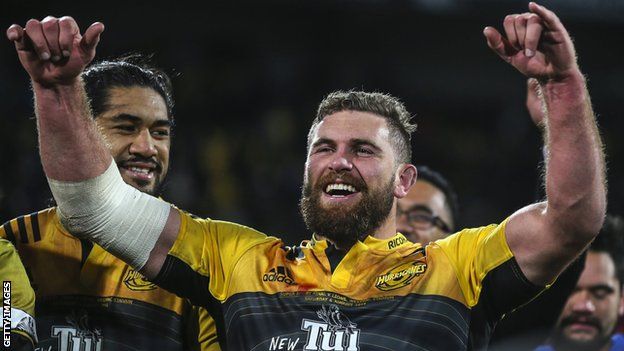Super Rugby to cut three sides for 15-team format from 2018
- Published

New Zealand's Hurricanes are the reigning Super Rugby Champions
Super Rugby will revert to a 15-team format from next season, with three current sides set to be cut.
Governing body Sanzaar, external has not confirmed which sides are to be cut but South Africa will lose two teams, with Australia losing one side.
The competition expanded to 18 teams in 2016, when South Africa's Southern Kings, Argentina's Jaguares and Japan's Sunwolves joined.
Jaguares and Sunwolves will retain their places for 2018.
They will be joined in the 15-team structure by all five current New Zealand teams, four from Australia and four from South Africa.
The sides will again be split into three conferences, down from four, with Sunwolves moving into the Australia conference, while Jaguares will play in a South Africa conference made up from the remaining teams in the two current Africa conferences.
The South Africa and Australia rugby unions will decide which teams to cut from the competition.
"Naturally we understand that there will be some very disappointed franchises but the tournament's long-term future and the economic reality of the business at present is something that had to be addressed," said Sanzaar chairman Brent Impey.
"The decision to retain the Sunwolves is linked directly to Sanzaar's strategic plan for the future.'
"The potential for growth of the sport in Asia off the back of the establishment of the Sunwolves and the impending Rugby World Cup in 2019 is significant."
The Australian rugby union players' association (RUPA) said it was "incredibly frustrated and deeply disappointed" that the Australian Rugby Union (ARU) had agreed to axe one of their clubs.
"Having signed Australian rugby up to a competition which reduced local content, diluted tribalism and disrespected fans with its lack of integrity, ARU have now agreed to a new model which has protected the expansion teams in Argentina and Japan at the cost of one of our own," said RUPA chief executive Ross Xenos.
"It is tomorrow's players, coaches and fans who will now pay the price for this strategic mismanagement. This decision will be the catalyst for an irresponsible human cost without any genuine remedies to the real strategic issues that the game faces."
The Super Rugby competition initially expanded to 15 teams from 2011, with the addition of Australian side Melbourne Rebels, having previously been named Super 14 from 2006 to 2010.
- Published17 March 2017